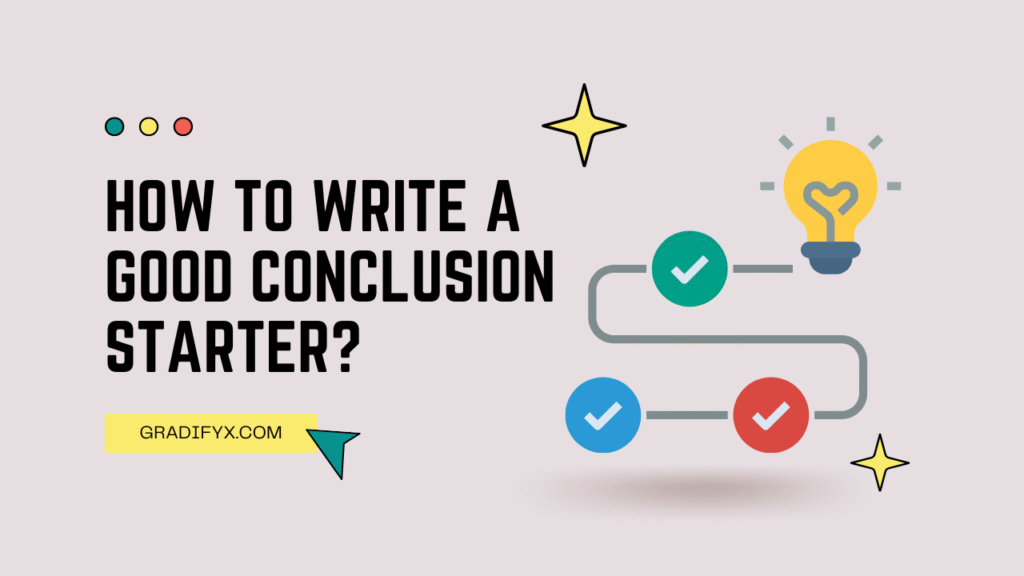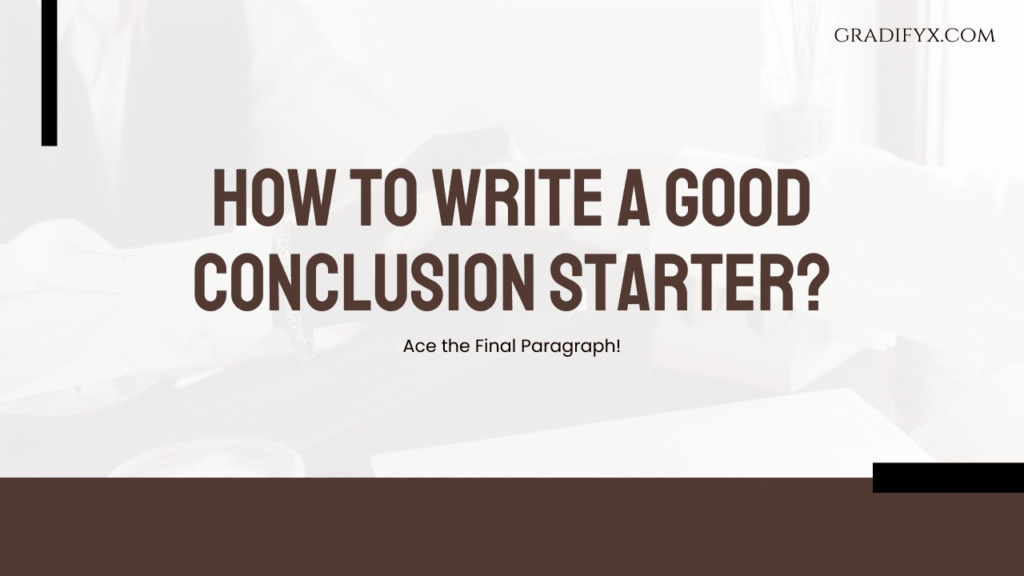Conclusion Starters: Mastering Conclusions with Right Phrases

A good piece of writing is not just about a convincing introduction or well-founded body paragraphs. Another point of significance is how you conclude your final paragraph. It is often ignored as a side gig but not; conclusion starters can leave a strong impression. This blog discusses in detail how to deliver a good conclusion.
Conclusion Sentence Starters: How to Summarize the Final Statement?
Readers may not view your write-up thoroughly but they critically analyze your introduction and conclusion. Concluding sentence starters have the power to make or break your written piece. This is why careful thought is needed when writing conclusions. Pay attention to the following ideas:
Indicate the Ending
Similar to how an audience can identify a starting paragraph with words like “First,” or “In this introduction,” they should be able to tell that you are writing the final section. A conclusion should alert your reader that your argument is about to be completed.
Strengthen Your Argument
A well put summary can refocus your reader’s attention to your main theme, ensuring the lively spirit of your message.
Improve Cohesion and Flow
If your transition from body paragraphs to the conclusion paragraph is smooth, then the reader is more likely to be hooked to the text of your point.
Capture Thought and Emotion
All starters are not alike—some of them reinforce ideas, some set up reflection, and some prompt action. In any case, a good conclusion sentence is necessary, whether it is an assignment, thesis, essay, research papers, or other academic work.
5 Kinds of Concluding Paragraphs
Looking for good conclusion starters? These are a few categories you should be attentive to, as each of them serves a specific purpose.
Reflection
Reflection offers perspective or insight. You use words like “In retrospect,” “As we reflect,” and “Reviewing this” in this category.
Call to Action
When we want to prompt particular actions, we use terms like “Now is the time,” “Take these steps,” “This option is for you,” etc.
Rhetorical Question
A rhetorical question is considered a fine way to write a conclusion. Here we engage readers by asking them catchy questions such as “Should we ignore?” “Where will this knowledge bring us?”
Future Implications
Direct your audience towards what is next. “As we begin,” “For the next part,” and “Going ahead” are a few words and phrases for this kind of final part.
Summary
This kind is used when you want to recap key points. Some examples include “As we sum up,” “Such findings,” and “Lastly,” among other similar ones.
All good conclusion starters involve more or less the same categories. There might be others but none that could surpass these.

A Collection of Appealing Conclusion Starters
Now that you have reached the final section of your paper, enhance your diction toolkit through the following words and phrases:
Reflection
- Keeping this in mind…
- As we look back…
- After observing the proof…
- Considering the issue…
- Having analyzed the matter…
- From my point of view…
- Reflecting these techniques…
- Looking back to…
- In retrospect…
- As we reflect on…
Rhetorical Questions
- Can we bear the challenge?
- Does it mean good for us?
- Do our choices define who we are?
- Are we prepared for the future?
- What happens if we do nothing?
- Who is the biggest beneficiary of this result?
- Should we leave this legacy for the upcoming generations?
- How far should we go for this?
- What is the lesson in this?
Future Implications
- Above the horizon…
- In the distant future…
- Anticipating next…
- The path ahead requires…
- Specific ways involve…
- Future results must…
- In the days to come…
- As the guide claims…
- Going ahead…
Call to Action
- You can…
- We urge you to…
- You should start…
- Together, we will…
- The time has come for…
- We should commit to…
- I cannot afford…
- It is inevitable that…
- Your speech should…
- Therefore, I must connect...
Summary
- In the closing bit…
- Finally, …
- Primarily, …
- Briefly, …
- Considering all things…
- As we recap…
- Overall, …
- To summarize the topic…
Successful conclusion paragraph starters use similar words and phrases in common observation. You could pick up a hint or two about these and use them in your next work.
Rewarding Tips for Effective Conclusion Starters
The following are impressive ways to come up with professional conclusion starters.
Match the Tone
Every persuasive post and academic work requires different voices. The tone is dissimilar as topics vary. Make sure your conclusion does not betray the set tone.
Overcome Clichés
Do not rely on overused words. Craft your conclusion in a way that is neither cliche nor shows lifeless text. Your conclusion should radiate your peak writing prowess.
Remain Consistent
If you have utilized transitional markers or numbering, you should not lose that logic in the final paragraph.
Adopt Conciseness
A conclusion is a crucial infotainment piece in your writing. Connect it to your subject matter in a way that it should be concise and remains relevant to your discourse.
Do not Introduce
Restate what has already been said above. If you introduce new arguments here, you do not have enough capacity to sum them up in a practical way.
Personalize According to Your Audience
Goes without saying but it is a super crucial step to identify your readership beforehand. Even if your work is informative and displays skills, it is wasted on the wrong audience.
If your closing sentence starters follow these instructions, then there is little to no doubt of impressing your audience. These are the words to start a conclusion; best not to lose focus, and incorporate them in your writing.
The Impact of a Bad Conclusion on Alex’s Performance
Alex—a young, aspiring wordsmith—would research well and work hard on his writing pieces. His work, whether academic or fictional, would not leave a lasting impact on his readers.
Depressed by a lack of success, one sad evening, he stumbled upon the idea of conclusion starters. Having read multiple posts on the matter, he decided to adopt this new technique. As he practiced writing the final paragraph a few times, he found himself writing a satisfying conclusion.
Eventually, Alex gained the recognition of a successful and inspiring writer online.
Students Learning About Constructive Conclusion Starters in Universities
Many students across the globe struggle with the idea of writing a meaningful conclusion. They have imagined the best bits of writing: from high points of body paragraphs to interesting facts to a nice piece of information.
The conclusion is a different league. It is a gigantic challenge. This is why Gradifyx finds many of our clients on the matter from the University of Texas and the University of Virginia, among many other students. And they are ever-grateful for our service.
Conclusion
Beneficial conclusion starters are fresh weaponry in your writing stock: indispensable, reliable, and versatile. Whether you want to prompt action, pose thoughtful questions, anticipate the upcoming results, reflect, or summarize—the right conclusion opener delivers an unforgettable ending to your entire argument. You could rely on this guide and the tips it has highlighted to win your readers and make them your fans.
Frequently Asked Questions
What makes for a good conclusion starter?
Strong ending words and phrases leave a powerful impression on your reader. Write concisely, clearly, and do not add new information.
What are 5 good sentence starters for the conclusion?
The five crafty sentence starters for the final paragraph are:
- As we now know…
- Does this mean that…
- Evidenced by the…
- It is time to show…
- Now the outcome indicates…
What is an impressive final sentence?
A strong conclusion starter links the sentence pack to your central theme. It does not keep the reader guessing; it gives a proper ending to all the raised points and moves towards the most viable direction of the solution.
How to start the conclusion in my writing piece?
Do not lose the touch of your key explanation. It should firmly reinforce the best possible way to the raised argument or point.
Get Your Assignment Now!
